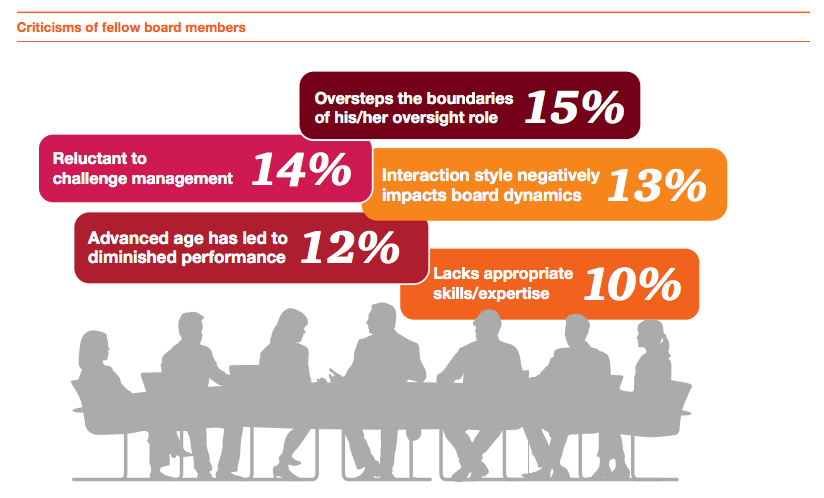Each year, PwC's Annual Corporate Directors Survey provides a progress report on the performance of corporate boards across critical aspects of governance: shareholder engagement, board refreshment, diversity, activism, director competence, and many others.
 The Annual Survey offers a rare window into the minds of nearly 900 corporate directors as they weigh in on governance topics, board dynamics, and their fellow directors.
Last year, we took a deep dive into the 2016 survey results to review ''the good, bad, and ugly'' aspects of corporate board performance. We've taken a similar approach this year by highlighting the major trends and takeaways from the 2017 survey.
The Annual Survey offers a rare window into the minds of nearly 900 corporate directors as they weigh in on governance topics, board dynamics, and their fellow directors.
Last year, we took a deep dive into the 2016 survey results to review ''the good, bad, and ugly'' aspects of corporate board performance. We've taken a similar approach this year by highlighting the major trends and takeaways from the 2017 survey.
_____________________________________
 As board members warm up to the idea of shareholder engagement, we're seeing improvements in the quality of those meetings. Investors and proxy advisors have recognized strides in boards' willingness to engage and ensure the right people are present; additionally, 84% of directors indicated that investors were well-prepared for those meetings in 2017 (up from 63% in 2016).
The majority of directors, however, still feel that shareholder engagement should be ''triggered''-whether by a crisis, an activist position in the company, or a negative proxy advisor recommendation. Only 22% believed that shareholder engagement should be approached as a regular dialogue on a variety of governance matters.
Looking Ahead: We're seeing board members answer investors' call for engagement, and in the years ahead, we expect to see this practice become more routine. Boards must increasingly approach shareholder engagement as an opportunity to demonstrate their competence and preparedness. In 2018, directors should focus on how they can continue to improve the quality of these meetings. Investors have already provided boards with some valuable feedback for the taking in our recent post, 5 Investor Expectations for Shareholder Engagement.
As board members warm up to the idea of shareholder engagement, we're seeing improvements in the quality of those meetings. Investors and proxy advisors have recognized strides in boards' willingness to engage and ensure the right people are present; additionally, 84% of directors indicated that investors were well-prepared for those meetings in 2017 (up from 63% in 2016).
The majority of directors, however, still feel that shareholder engagement should be ''triggered''-whether by a crisis, an activist position in the company, or a negative proxy advisor recommendation. Only 22% believed that shareholder engagement should be approached as a regular dialogue on a variety of governance matters.
Looking Ahead: We're seeing board members answer investors' call for engagement, and in the years ahead, we expect to see this practice become more routine. Boards must increasingly approach shareholder engagement as an opportunity to demonstrate their competence and preparedness. In 2018, directors should focus on how they can continue to improve the quality of these meetings. Investors have already provided boards with some valuable feedback for the taking in our recent post, 5 Investor Expectations for Shareholder Engagement.
 As BlackRock and Vanguard explain, the evaluation process serves as a simple indicator of your board's dynamics and governance proficiency. The most effective boards are hungry for feedback, responsive to their environment, and committed to take the actions necessary for long-term value creation.
Within the 2017 survey results, we still see many opportunities for improvement. Only 15% of directors say that a board member ''was provided with counsel or was not renominated as a result of the assessment process''-despite the fact that nearly half of directors indicated that someone on their board should be replaced. (But more on this in a minute!)
Board leadership received high marks in this year's survey results; yet, their greatest weakness remains ''dealing with underperforming directors,'' as 24% of board members indicated their board leadership was "not very" or "not at all" effective in this area.
Looking Ahead: We applaud boards for their improvements to the evaluation process. With investors placing a greater focus on board assessments, directors must strive to be even more intentional in their evaluation design and disclosure. Whether your board is looking for guidance on facilitators or methodologies, our six-part Board Evaluations Blog Series is a good starting point. In addition, the Guide to Effective Proxies is an excellent resource for evaluation disclosure; published by Donnelley Financial Solutions after each proxy season, it provides dozens of best-in-class examples starting on page 155.
As BlackRock and Vanguard explain, the evaluation process serves as a simple indicator of your board's dynamics and governance proficiency. The most effective boards are hungry for feedback, responsive to their environment, and committed to take the actions necessary for long-term value creation.
Within the 2017 survey results, we still see many opportunities for improvement. Only 15% of directors say that a board member ''was provided with counsel or was not renominated as a result of the assessment process''-despite the fact that nearly half of directors indicated that someone on their board should be replaced. (But more on this in a minute!)
Board leadership received high marks in this year's survey results; yet, their greatest weakness remains ''dealing with underperforming directors,'' as 24% of board members indicated their board leadership was "not very" or "not at all" effective in this area.
Looking Ahead: We applaud boards for their improvements to the evaluation process. With investors placing a greater focus on board assessments, directors must strive to be even more intentional in their evaluation design and disclosure. Whether your board is looking for guidance on facilitators or methodologies, our six-part Board Evaluations Blog Series is a good starting point. In addition, the Guide to Effective Proxies is an excellent resource for evaluation disclosure; published by Donnelley Financial Solutions after each proxy season, it provides dozens of best-in-class examples starting on page 155.
 With little consensus among the reasons given by directors, this becomes a difficult challenge to address. For example, the number of directors who are ''reluctant to challenge management'' roughly matches those who ''overstep the boundaries of their oversight role.''
On the positive side, we're seeing fewer instances where board members are ''unprepared for meetings,'' which was the number-one reason given in 2016 for why board members should be replaced (25% in 2016 vs. 7% in 2017).
As PwC points out in the survey analysis, conversations about board composition in 2017 have become increasingly ''high stakes''. Activists are putting pressure on tenured directors, while investors call for more diverse and digital skill sets in the boardroom. Boards likely feel the pressure to make every board seat count, lest they end up in shareholder crosshairs or lagging competitors in innovation.
Looking Ahead: Board leadership remains the biggest change agent in this equation. As your board looks to elect the next chairman or nom/gov committee chair, ensure that the board is considering candidates capable of having tough conversations and making difficult decisions. While effective leaders range widely in style and personality, board leadership must be able to instill a performance measurement mindset while balancing the delicate fabric of board collegiality. Those individuals will continue to drive board performance in the years ahead. More resources on our Board Leadership resource page.
With little consensus among the reasons given by directors, this becomes a difficult challenge to address. For example, the number of directors who are ''reluctant to challenge management'' roughly matches those who ''overstep the boundaries of their oversight role.''
On the positive side, we're seeing fewer instances where board members are ''unprepared for meetings,'' which was the number-one reason given in 2016 for why board members should be replaced (25% in 2016 vs. 7% in 2017).
As PwC points out in the survey analysis, conversations about board composition in 2017 have become increasingly ''high stakes''. Activists are putting pressure on tenured directors, while investors call for more diverse and digital skill sets in the boardroom. Boards likely feel the pressure to make every board seat count, lest they end up in shareholder crosshairs or lagging competitors in innovation.
Looking Ahead: Board leadership remains the biggest change agent in this equation. As your board looks to elect the next chairman or nom/gov committee chair, ensure that the board is considering candidates capable of having tough conversations and making difficult decisions. While effective leaders range widely in style and personality, board leadership must be able to instill a performance measurement mindset while balancing the delicate fabric of board collegiality. Those individuals will continue to drive board performance in the years ahead. More resources on our Board Leadership resource page.
In the scope of PwC's 2017 Annual Corporate Directors Survey, we've barely scratched the surface. While great strides have been made in aligning investor and board member interests across shareholder engagement or proxy disclosure, there are notable rifts in other areas-namely diversity and ESG issues. The 2017 survey also delves into directors' experience with activism, technological change, and strategy oversight.
 The Annual Survey offers a rare window into the minds of nearly 900 corporate directors as they weigh in on governance topics, board dynamics, and their fellow directors.
Last year, we took a deep dive into the 2016 survey results to review ''the good, bad, and ugly'' aspects of corporate board performance. We've taken a similar approach this year by highlighting the major trends and takeaways from the 2017 survey.
The Annual Survey offers a rare window into the minds of nearly 900 corporate directors as they weigh in on governance topics, board dynamics, and their fellow directors.
Last year, we took a deep dive into the 2016 survey results to review ''the good, bad, and ugly'' aspects of corporate board performance. We've taken a similar approach this year by highlighting the major trends and takeaways from the 2017 survey.
Key Takeaways from the 2017 Survey
1. More directors are recognizing the value of shareholder engagement.
What was once an awkward and rarely implemented practice is becoming more widely accepted-and productive. Not only do board members feel more prepared for shareholder engagements in 2017, but they are recognizing the positive impact on board insights and proxy voting.* A majority of directors (76%) at least 'somewhat' believe that their board received valuable insights from shareholder engagement; 77% believe that their engagements positively impacted (or is likely to positively impact) proxy voting (up from 59% in 2016).
 As board members warm up to the idea of shareholder engagement, we're seeing improvements in the quality of those meetings. Investors and proxy advisors have recognized strides in boards' willingness to engage and ensure the right people are present; additionally, 84% of directors indicated that investors were well-prepared for those meetings in 2017 (up from 63% in 2016).
The majority of directors, however, still feel that shareholder engagement should be ''triggered''-whether by a crisis, an activist position in the company, or a negative proxy advisor recommendation. Only 22% believed that shareholder engagement should be approached as a regular dialogue on a variety of governance matters.
Looking Ahead: We're seeing board members answer investors' call for engagement, and in the years ahead, we expect to see this practice become more routine. Boards must increasingly approach shareholder engagement as an opportunity to demonstrate their competence and preparedness. In 2018, directors should focus on how they can continue to improve the quality of these meetings. Investors have already provided boards with some valuable feedback for the taking in our recent post, 5 Investor Expectations for Shareholder Engagement.
As board members warm up to the idea of shareholder engagement, we're seeing improvements in the quality of those meetings. Investors and proxy advisors have recognized strides in boards' willingness to engage and ensure the right people are present; additionally, 84% of directors indicated that investors were well-prepared for those meetings in 2017 (up from 63% in 2016).
The majority of directors, however, still feel that shareholder engagement should be ''triggered''-whether by a crisis, an activist position in the company, or a negative proxy advisor recommendation. Only 22% believed that shareholder engagement should be approached as a regular dialogue on a variety of governance matters.
Looking Ahead: We're seeing board members answer investors' call for engagement, and in the years ahead, we expect to see this practice become more routine. Boards must increasingly approach shareholder engagement as an opportunity to demonstrate their competence and preparedness. In 2018, directors should focus on how they can continue to improve the quality of these meetings. Investors have already provided boards with some valuable feedback for the taking in our recent post, 5 Investor Expectations for Shareholder Engagement.
2. More boards are taking action on their performance evaluation results.
The evaluation is the board's most valuable feedback loop, which has become the cornerstone for board refreshment, measuring committee effectiveness, composition and strategy alignment, and various other governance aspects. Recognizing this, institutional investors have placed a greater focus on board evaluations in 2017.* More than two-thirds (68%) of directors say that their board has taken some action in response to their last board assessment (up from 49% last year).
 As BlackRock and Vanguard explain, the evaluation process serves as a simple indicator of your board's dynamics and governance proficiency. The most effective boards are hungry for feedback, responsive to their environment, and committed to take the actions necessary for long-term value creation.
Within the 2017 survey results, we still see many opportunities for improvement. Only 15% of directors say that a board member ''was provided with counsel or was not renominated as a result of the assessment process''-despite the fact that nearly half of directors indicated that someone on their board should be replaced. (But more on this in a minute!)
Board leadership received high marks in this year's survey results; yet, their greatest weakness remains ''dealing with underperforming directors,'' as 24% of board members indicated their board leadership was "not very" or "not at all" effective in this area.
Looking Ahead: We applaud boards for their improvements to the evaluation process. With investors placing a greater focus on board assessments, directors must strive to be even more intentional in their evaluation design and disclosure. Whether your board is looking for guidance on facilitators or methodologies, our six-part Board Evaluations Blog Series is a good starting point. In addition, the Guide to Effective Proxies is an excellent resource for evaluation disclosure; published by Donnelley Financial Solutions after each proxy season, it provides dozens of best-in-class examples starting on page 155.
As BlackRock and Vanguard explain, the evaluation process serves as a simple indicator of your board's dynamics and governance proficiency. The most effective boards are hungry for feedback, responsive to their environment, and committed to take the actions necessary for long-term value creation.
Within the 2017 survey results, we still see many opportunities for improvement. Only 15% of directors say that a board member ''was provided with counsel or was not renominated as a result of the assessment process''-despite the fact that nearly half of directors indicated that someone on their board should be replaced. (But more on this in a minute!)
Board leadership received high marks in this year's survey results; yet, their greatest weakness remains ''dealing with underperforming directors,'' as 24% of board members indicated their board leadership was "not very" or "not at all" effective in this area.
Looking Ahead: We applaud boards for their improvements to the evaluation process. With investors placing a greater focus on board assessments, directors must strive to be even more intentional in their evaluation design and disclosure. Whether your board is looking for guidance on facilitators or methodologies, our six-part Board Evaluations Blog Series is a good starting point. In addition, the Guide to Effective Proxies is an excellent resource for evaluation disclosure; published by Donnelley Financial Solutions after each proxy season, it provides dozens of best-in-class examples starting on page 155.
3. Director concern over peer performance has reached a record high.
PwC has had this question in their survey for many years, and we regret to report that the numbers are moving in the wrong direction. In 2017, the percentage of board members who are concerned about the performance of a fellow director hit an all-time high.* Nearly half (46%) of directors believe that one or more of their fellow board members should be replaced. One-fifth of directors say that two or more directors on their board should be replaced.
 With little consensus among the reasons given by directors, this becomes a difficult challenge to address. For example, the number of directors who are ''reluctant to challenge management'' roughly matches those who ''overstep the boundaries of their oversight role.''
On the positive side, we're seeing fewer instances where board members are ''unprepared for meetings,'' which was the number-one reason given in 2016 for why board members should be replaced (25% in 2016 vs. 7% in 2017).
As PwC points out in the survey analysis, conversations about board composition in 2017 have become increasingly ''high stakes''. Activists are putting pressure on tenured directors, while investors call for more diverse and digital skill sets in the boardroom. Boards likely feel the pressure to make every board seat count, lest they end up in shareholder crosshairs or lagging competitors in innovation.
Looking Ahead: Board leadership remains the biggest change agent in this equation. As your board looks to elect the next chairman or nom/gov committee chair, ensure that the board is considering candidates capable of having tough conversations and making difficult decisions. While effective leaders range widely in style and personality, board leadership must be able to instill a performance measurement mindset while balancing the delicate fabric of board collegiality. Those individuals will continue to drive board performance in the years ahead. More resources on our Board Leadership resource page.
With little consensus among the reasons given by directors, this becomes a difficult challenge to address. For example, the number of directors who are ''reluctant to challenge management'' roughly matches those who ''overstep the boundaries of their oversight role.''
On the positive side, we're seeing fewer instances where board members are ''unprepared for meetings,'' which was the number-one reason given in 2016 for why board members should be replaced (25% in 2016 vs. 7% in 2017).
As PwC points out in the survey analysis, conversations about board composition in 2017 have become increasingly ''high stakes''. Activists are putting pressure on tenured directors, while investors call for more diverse and digital skill sets in the boardroom. Boards likely feel the pressure to make every board seat count, lest they end up in shareholder crosshairs or lagging competitors in innovation.
Looking Ahead: Board leadership remains the biggest change agent in this equation. As your board looks to elect the next chairman or nom/gov committee chair, ensure that the board is considering candidates capable of having tough conversations and making difficult decisions. While effective leaders range widely in style and personality, board leadership must be able to instill a performance measurement mindset while balancing the delicate fabric of board collegiality. Those individuals will continue to drive board performance in the years ahead. More resources on our Board Leadership resource page.
In the scope of PwC's 2017 Annual Corporate Directors Survey, we've barely scratched the surface. While great strides have been made in aligning investor and board member interests across shareholder engagement or proxy disclosure, there are notable rifts in other areas-namely diversity and ESG issues. The 2017 survey also delves into directors' experience with activism, technological change, and strategy oversight.
Don't Miss our Panel on PwC's 2017 Survey Results:
[embed]https://www.youtube.com/watch?v=r1Q1iaMdZa0[/embed]
Media Highlights
Environmental, social and governance (ESG) issues have become more complex and multifaceted than ever before. At the same time, ESG continues to ascend on board and leadership agendas.
In this buyer’s guide, we explore what a market-leading ESG solution should look like and highlight the key areas organisations should be prioritising as they embark on their search.




